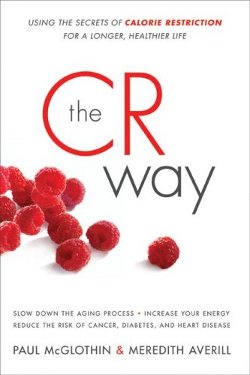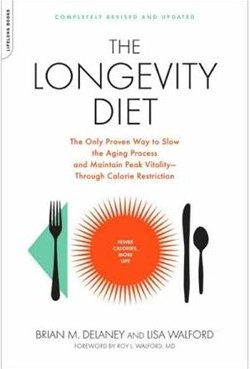Calorie Restriction and Living Longer
During the 20th century the life expectancy grew from an average of 47 years to about 70-80 years, in part because of improved healthcare and hygiene as well as the development of antibiotics and vaccines. In some places even greater incidence of extraordinary life spans has even been observed, like the Japanese from Okinawa, who have the highest number of centenaries in the world.
This cannot be explained by the same improvements that led to the extension of life expectancy elsewhere in the world. The quest to unveil the reasons behind their increased longevity has captured the mind of biogerontologists, who have spent decades investigating the causes, mechanisms and consequences of aging. Dr. Aubrey de Grey, the leader of the strategies for engineered negligible senescence (SENS) foundation, suggests that
Aging exists in nature for just the same reason that aging exists in man-made structures and machines: it is the default, and genes are required to combat it, just as mechanics and their ilk are required to combat the aging of man-made objects.
Today, with the help of modern medicine and science, researchers have been making great progress in understanding how the aging process works and how we can control or even reverse it to some extent. The SENS foundation (and its affiliated researchers) has been pivotal to this effort, being involved in bringing innovation such as rejuvenating the immune system to better fight disease in later years or using stem cells to treat Parkinson’s disease. Other unaffiliated biogerontologists have also made remarkable advancements like the development of a drug that might reverse aging-related decline of the brain.
While these new techniques and breakthroughs are very exciting, we are still at least a few decades away from seeing practical applications. However, there are two lifestyle factors which can have a remarkable effect on how we age, and are well within our control: exercise and diet. Exercise is a good strategy to stave off secondary aging (aging that comes as a consequence of disease), as it can be seen by its effect on the health of people suffering from kidney disease or in the prevention of damage linked to Alzheimer's disease. A good diet can not only have benefits when it comes to secondary aging, but it can even extend the maximum life span slowing down primary (disease independent) aging.
Diet and life extension
When it comes to diet, attention tends to be immediately drawn to healthy eating (something that nutritionists have been advocating for decades) as the ultimate goal, but even more can be potentially accomplished with dietary change. A very successful strategy for increasing life span is, in fact, calorie restriction. Something as simple as reducing the amount of energy we obtain from food beyond the recommended daily intake levels, while ensuring that the diet still includes enough nutrients.

Although this idea might seem counter-intuitive, eating less may make it possible to live longer. Several studies conducted on animals prove that. In particular, studies on mice reveal a very interesting trend. Individuals which had a diet with the full recommended daily dosage of nutrients but with calorie restriction lived longer if they started on a calorie restricted diet early, just after their growing period. In fact, such a strategy extended life up to an incredible 80% in young animals and still provided a 20-30% increase in lifespan of animals which were already middle-aged by the time their diet was changed. Still, the benefits did not stop there, not only did the animals live longer, but they were healthy throughout the course of their lives. In Rhesus monkeys (who share more in common with humans than rats), long-term studies are now being carried out and preliminary reports (at a stage where monkeys have reached their average life expectancy) point to a three-fold difference in deaths due to age-related illness between a calorie restricted group and monkeys fed a regular diet.
How calorie restriction works
Our bodies accumulate energy in the form of a reusable molecule, ATP. Every time we breathe, move or even think we use ATP, which then needs to be recharged. That happens in specific sites in our cells, the mitochondria, which are structures akin to power stations, where a number of complex reactions (which depend on the presence of oxygen) spring life back into the ATP molecule in a never ending cycle. However, sometimes that operation malfunctions and the oxygen we breathe (which is essential for the whole process) is affected in an undesirable fashion, creating damaging molecules which would cause havoc if left to roam free. To stop these molecules our cells have mechanisms designed to neutralize them, a task at which they are fairly effective during youth (although damage often starts decades before any symptoms are evident). But they become less and less so as the years go by, when damage progressively becomes rampant.
This accumulated damage is likely to be behind the cellular "garbage" which causes Parkinson's or Alzheimer's disease; chronic inflammation responsible for rheumatoid arthritis or atherosclerosis; changes in lipid metabolism, which lead to type 2 diabetes and muscle loss; and many other diseases which tend to lead to premature death. Calorie restriction has been shown to reduce the rate at which all these different types of damage occur and, while the exact molecular mechanisms are not yet clear, is likely to do so on two fronts. First, by increasing the efficiency of the mechanisms that prevent damaging oxygen molecules from having detrimental effects. Second, by reducing the amount of damaging oxygen molecules from the start. In addition, it is hypothesized calorie restriction might reduce the metabolic rate itself. This would be in line with the observation that calorie restricted animals tend to have lower body temperature, but further research on the subject is still needed.
You can live longer too
Human trials conducted so far support the hypothesis that calorie restriction is a valid and useful method in extending life span. Despite the relatively short duration of the experiments, several studies show calorie restriction has the ability to reduce the effects of secondary aging (for example by starving cancer or reducing the severity of diabetes and cardiovascular disease) and even to slow down primary aging, thus extending the maximum lifespan an individual could hope for. In addition, populations which endured food shortages are known to have lived longer and healthier lives. The Okinawan example is, once again, of great relevance. This population had an impoverished diet during world war II which, combined with a naturally calorie restricted diet, has made it possible for individuals who were adult when the war broke to be alive today. Although genetic factors may also be in play, the fact younger Okinawans who opted for an approximation to a Western diet are facing much lower life expectancy is a strong indicator calorie restriction was at least partly responsible for the beneficial effects observed.
Nevertheless, there are some hazards to this approach. Calorie restriction is not suitable for children and teenagers, who are in a particular phase of development which requires large energy intake. There is risk of stunted growth and cognitive dysfunction. On the other end of the spectrum, the fact that calorie restriction is correlated with moderate loss of bone and muscle mass exposes the elderly to a potentially larger danger of bone fractures and loss of mobility. Moreover, even on healthy adults this is a strategy which requires significant attention, as particular care is needed to ensure the nutritional needs are consistently met and the energy intake is not too low, since such behaviour effectively consists of starvation. This is very undesirable because it is the percursor of a plethora of metabolic changes leading up to further muscle mass loss as well as hormonal imbalance and increased cellular stress levels, therefore cancelling out all the positive effects of calorie restriction.

